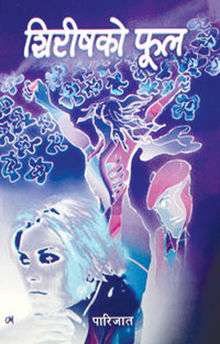Shiris Ko Phool
 Cover-page of Shiris ko Phool | |
| Author | Parijat |
|---|---|
| Original title | शिरीषको फूल |
| Translator | Orchid Books |
| Country | Nepal |
| Language | Nepali |
| Series | Shiris Ko Phool Book Series |
| Genre | Novel |
| Publisher | Sajha Prakashan, Kathmandu, Nepal |
Publication date | 1965 |
| Media type | |
| Pages | 65 |
| ISBN | 9993340995 |
| Followed by | The Blue Mimosa |
About Author
Parijat was the nom de plume of Bishnu Kumari Waiba (1937-1993), a novelist, poet, and short story writer. Born in Darjeeling, India where she completed part of her schooling, she moved to Kathmandu, Nepal where she spent the rest of her life. Her first novel The Blue Mimosa.[1] (Nepali: शिरिषको फूल) was published in 1965. The novel received Madan Puraskar, the award offered in Nepal for The Best Book Of The Year. She was, and still is regarded as the first modern novelist of Nepal. The novel is highly acclaimed in Nepali literature, proving to introduce Nepalese Literature in a global platform. It has been translated and adapted in the literature curriculum of some colleges in some English speaking countries.
Summary
Parijat is the pseudonym name claimed by Bishnu Kumari Waiba. In her book, Sirish ko Phool (Blue Mimosa), 1965, she writes through a male narrative. The flip of gender binaries strategically positions herself in the patriarchal environment during that time period and opens up a dialogue between the two.
The book enters a post war veteran sub context as the narrator that is engaged in various forms of communication of love and life and delves into the preconceived structures of gender binaries. It analyses and makes way for a critical dialogue about the complexities of identities and trauma. It highlights the irrelevance of a patriarchal community during a time of toxic patriarchy.
Plot
Suyogbir,45, is the main male protagonist. An ex-army serviceman Suyog fought against Japan in the second world war but being poor hearted was not even able to kill a single soldier and had not received any medal. Although his village is in hills, he lives in Kathmandu valley. His daily routine has become to drink alcohol in the evenings in the bar. He brutally raped and murdered several indigenous girls and he remembers several incidents during the war.
He meets and becomes friend with Shivaraj in the bar. Shivaraj has three sisters: Mujura, Sakambari and Sanu. Suyogbir unknowingly becomes near to them all and falls in love with Sakambari but he finds difficult to tell her. One day finding her alone, he kisses her revealing his love towards her.
Later, Suyogbir stops visiting Shivaraj and his family. He later knows Sakambari was ill and one day he comes to know Sakambari has committed suicide.
Suyog concludes even one sided love kills.
Translated Version
This book has been translated as Blue Mimosa by Orchid Books and it was published in 2010